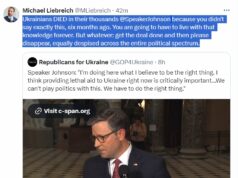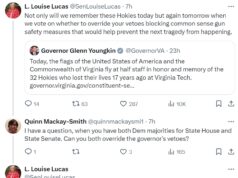Democrats, especially progressives, are undergoing an agonizing re-appraisal since the recent mid-term election. As always, the pundit class and the permanent Inside-the-Beltway Party are quick to tell us what to do: Democrats must move right, become more like Republicans—- and, as usual, they are dead wrong. I believe, based on exit polls as well as the results of who won and who lost, especially among the Democrats, that what we are seeing is the on-going internal re-alignment of the American two-party political system into a more ideologically based division, as well as the continuing encroachment of corporate political power, which is modifying our quaint republic, historically based on representative democracy, into something new, which I call “corporate feudalism.” The challenge is, how are progressives going to deal with these two situations, and the answers do not include becoming Republican Lite.
WHO VOTED? WHY?
In this election, true, the so-called center-right voters showed up, so that the universe of actual voters in 2010 had a different demographics from the universe of the 2008 voters. The larger universe of the 2008 voters gives the lie to the CW (conventional wisdom) that America is a center-right nation, since it is indeed the larger pool of voters, leading one to suspect that more Americans are instead center-left, not center-right…. larger turnout does usually equal more votes for Democratic candidates. This is generally borne out by various polls in which progressive policies, when not labeled as “liberal” or “progressive” but simply described, are overwhelmingly approved by Americans. The problem for Democrats is getting that larger universe of voters to vote, and for Republicans to suppress that larger universe of voters. Most early analyses of who voted in 2010 shows those center-left voters stayed home; even the composition of presumably independent voters was different in 2010 from that of 2008, so it is misleading to say independents as a group turned against Democrats this time, inasmuch as it was the Obama independents who were more likely to have stayed home. There are other hidden truths buried in this election.
Most Democratic analysts say this electoral stay-cation by Obama voters was due to faulty messaging, resulting in a so-called “enthusiasm gap,” for which some blame Obama, some blame Tim Kaine, Chair of the DNC, and all blame Democratic candidates as a whole for not staying on message, distancing themselves from the President, or being spineless and treacherous DINO’s (Democrats In Name Only). Of course, that assumes there was a Democratic message, one which also had a chance of reaching the American voter through the hostile filter of today’s corporate media. I am of the opinion that there was in fact no coherent Democratic message, and that any such animal, even if it had existed, would not have been consistently and forcefully delivered to, or even been noticed by, the American voter. Why? A combination of the fact that voters were utterly absorbed by, indeed, scared to death by, their personal economic situation, and were drowning in the well-funded cacophony of unrelenting agitprop from the reactionary right, which pretty much had the field to itself due to a lack of political leadership from the Obama administration.
Moreover, I believe that a progressive message, even if crafted, will not in the future have the slightest chance of getting through to its intended target, even when and if the economy improves, because of not only the overwhelming Niagara of right-wing propaganda which fills the media and drowns out alternate opinions, but the continued ineptitude of progressives, who appear detached from the common citizen and cannot articulate an emotionally compelling theme for each election, much less convey their over-arching philosophy. That is, this will be true if present trends continue and progressives do not change tactics.
RE-ALIGNMENT, IDEOLOGY, AND BIG MONEY
America’s two political parties, unlike those in European-style parliamentary democracies, have been characterized as being inclusive “big tents” rather than being ideology-based, with the Republicans having more finance-business-oriented groups (hence “rightist”) and the Democrats having more labor-populist members (hence “leftist”), with an overlap in the middle. Beginning with the success of the Civil Rights movement, this arrangement began changing to a more European-style, ideologically based alignment.
The Republicans began this purification process, first with their “Southern Strategy” to capture the disgruntled Southern white vote, which automatically forced them to absorb the pre-Civil War states’ rights philosophy into their platform; and next with a re-affirmation of their long-standing connection with bankers and big business in order to fund increasingly costly campaigns, and this tied them to the raw capitalism of Thomas Friedman’s Free Market theory and the rise of globalization. The Democrats did not quite realize what had happened, as their previously popular ideas from the New Deal were trivialized and denounced as “liberal,” anti-business, and therefore un-American.
The Republican transformation pulled the political spectrum further and further to the right, so that what had been the middle ground became considered leftist, and what had been the previous left was now demonized as “socialism,” and therefore utterly anti-American. Democrats, also strapped for money, accepted the Republican framing, and many agreed with the Free Market theory of capitalism, causing the DLC to persuade Democrats to mimic Republicans in order to cultivate campaign contributions from global corporations and Big Money. Indeed, during the past 40 years the Free Market philosophy has attained the status of a secular religion which one challenges at the risk of being accused of heresy, inviting character assassination and expulsion from the ruling clique, regardless of party affiliation.
The process of selecting candidates through primaries in which mainly dedicated members of the Republican base voted resulted inexorably in more and more ideologically pure true believers being elected, and in order to differentiate themselves and their party it was necessary to define and re-define the Democrats as “the other,” that is, dangerous and unacceptable. The Democrats floundered around, uncertain how to respond, and permitted Republican strategists to define the Democratic party as being dramatically opposite the Republican, meaning weak, radical, and un-American, pro- socialism and big government. This process has been termed “polarization.” It has made it increasingly difficult to govern in a bipartisan manner since bipartisanship requires co-operation by the out-of-power other party. Why would you co-operate with the devil, whose whole philosophy was antithetical to yours? The natural end of this trend is of course gridlock.
What is noticeable after the midterm is that quite a few of the consevadem Blue Dogs lost their seats and most of the progressive Democrats retained theirs, making the reduced Democratic contingent in the House more progressive. The DINOs, that is the Republican Lite Congress people, have been replaced by genuine, ideologically purer right winger Republicans, and so the purging of both parties continues. While the American federal system of government will probably prevent a complete change to ideologically pure, no-middle-ground parties, the trend to more philosophically consistent parties will continue. In order to compete, Democrats will have to answer with a clear philosophy of their own. Right now, the average voter is quite clear on what Republicans stand for; when it comes to Democrats, his view is pretty much what the Republicans tell him that Democrats are—- not what Democrats tell him. Sadly, corporate money and corporate media give him no other narrative, especially in the Fox-dominated midlands, where that is literally the only choice available.
ANSWERS
Democrats must enunciate an alternate political-economic theory to replace the pernicious Free Market Theory so beloved of Republicans. It sanctified personal greed and the unregulated mystic “free market.” It brought us a new form of ruthless colonialism, and inevitably the Wall Street meltdown, economic collapse, and environmental degradation. Although worshiped as “capitalism,” today’s finance-dominated international corporotism is capitalism on steroids, and it deserves another name and a better description. Economic theory has moved beyond the Keynesian ideas of the mid-twentieth century, and it is time now to get rid of Friedmanism as well. Free market capitalism still has value, but lacks a mechanism for including social costs and environmental costs in its pricing mechanisms, it clearly cannot cope with computer-driven stock markets to direct capital flows—- in fact it fails on a global and macro level not merely to describe the market but to allocate investment well on its own. Democrats do have the basics of a political-economic philosophy describing the purpose of government. One short-hand description is the slogan “We’re in this together.” If you cannot agree, you should not be considered a Democrat.
When efforts to bring about social or political change fail initially, the most effective answer is to “take it to the people.” Arnold Toynbee, in his monumental Study of History, pointed out that it is the elites who bring along the vast majority of people, educating them to accept improvements. When intellectuals in Tsarist Russia failed repeatedly in attempts to Europeanize (read “modernize”) Russia they gave up on bringing change through the aristocratic elites, and “went to the people.” One reason the Republicans have been successful is their relentless training of the public in their version of free market capitalism. Therefore, progressives will have to stop talking endlessly to each other, and personally educate Americans on Democratic values and philosophy, especially in contrast to the Republican worship of impersonal, corporate greed and the wealthy haves versus the have-nots. Union organizers and social workers understand this well, and the techniques are already well understood. Lakoff has already provided lessons in re-framing issues and the dialog necessary to re-program minds into seeing and understanding things from a progressive point of view. Such re-programming is not easy; it requires constant repetition from the highest level on down by every progressive in every community.
Getting the Democratic message out will not happen through the mass media because that is under the thumb of conservatives (ignore conservative whining about “liberal media”—- that is a myth; while there may be a few individual liberal commentators, the media are owned by conservatives, who set the tone). Republican think tanks dominate crafting of reports and development of policies; conservative front organizations cultivate and educate rising young people and provide them with jobs. They have had 40 or 50 years to create their infrastructure. It is time to develop a progressive infrastructure. I believe it is critically important to have control of at least one institution of the mass media.
I recommend that a progressive non-profit group purchase National Public Radio and television channels. The Republicans constantly try to de-fund NPR; if they should finally succeed, it is all too probable that Murdoch or other ultra-conservatives will take it over, giving the right-wing almost total control of programming across America. Progressive should do it before the conservatives do. This would give us a Radio Free America with reality-based news and an outlet for the progressive viewpoint to balance Fox. It would be a start at improved messaging. Another step would be modernizing the Democratic Party at the state and local levels so as to deal with the Republican permanent campaign, and begin the task of changing the mental furniture of the voters. In my analysis of the Democrats in “Hard Lessons” after the Deeds campaign, the bluecommonwealth.com community came up with some great recommendations to strengthen the Democratic Party and make it more effective.
I am not the only one to say that it is the grassroots which will have to make the Democratic Party more ideologically cohesive and relevant. Clearly, what must be done will not come from the top. Starting now.


 Sign up for the Blue Virginia weekly newsletter
Sign up for the Blue Virginia weekly newsletter








![Sen. Mark Warner: “The best time to [pass aid to Ukraine] would have been months ago. The second best time is right now.”](https://bluevirginia.us/wp-content/uploads/2023/02/warner0207-100x75.jpg)